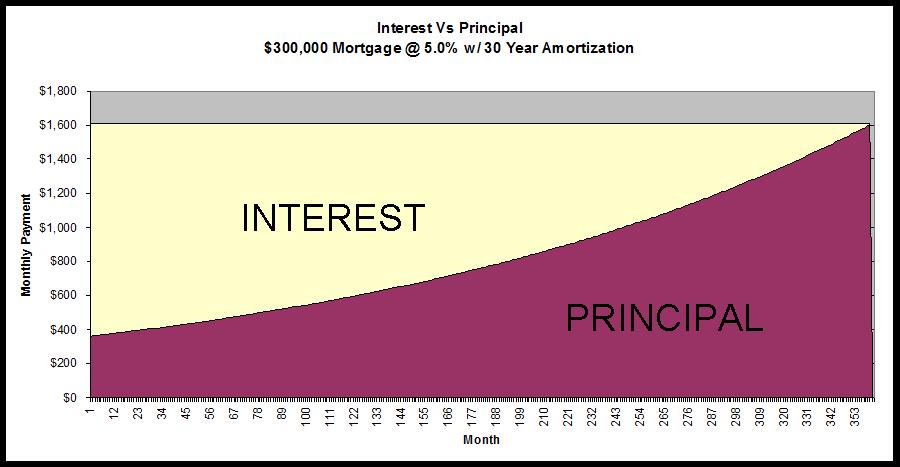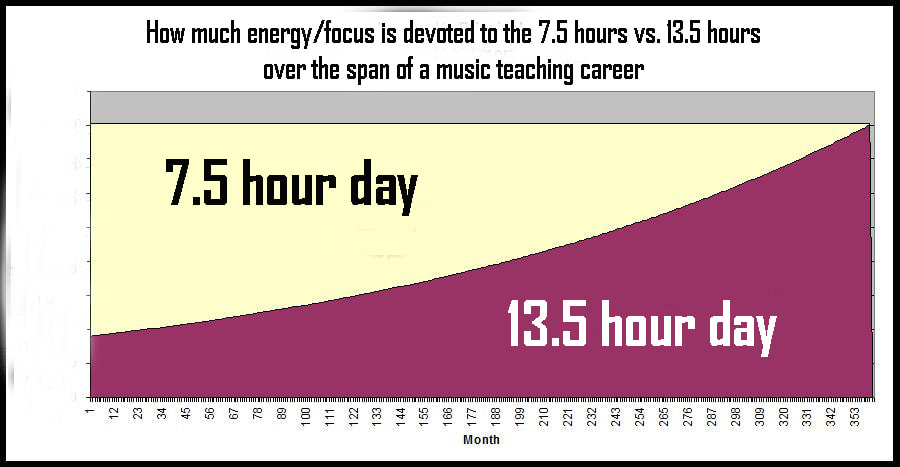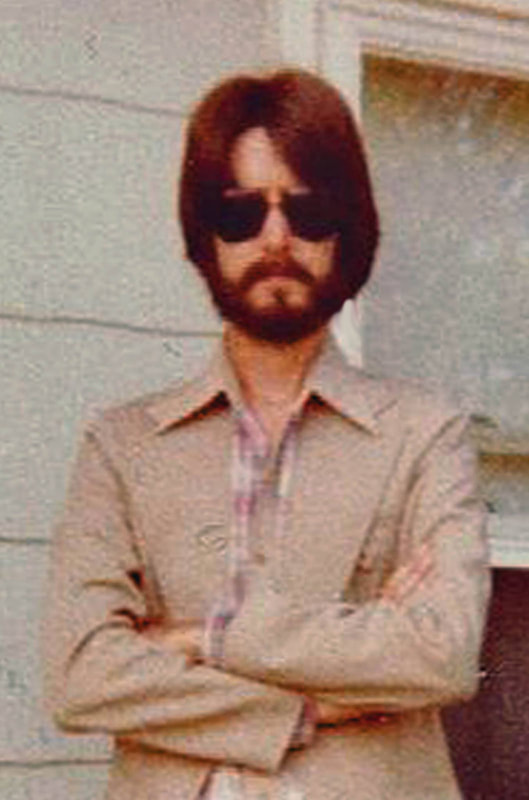I've mentioned in other posts that I've looked at my career in blocks of 7.5 hours and 16.5 hours within a 24 hour day. The 7.5 hours were when I worked at my job and the 16.5 hours was when I had my business. The job was working for a private school or a school district and the business was working for myself. While both time segments were as different as possible, they became positively intertwined and synergized to great professional advantage.

How we balance our time and energies between our job and business will determine how we create or defeat momentum in both arenas.
There are certain similarities between the 7.5/16.5 hour ratio of your career to the interest and principal payment ratio in the life of a mortgage.
There are certain similarities between the 7.5/16.5 hour ratio of your career to the interest and principal payment ratio in the life of a mortgage.
At the beginning of a mortgage, the majority of the payment is interest. At the beginning of a music teaching career, the bulk of your time and effort will be devoted to your 7.5 hour day, namely your job. You be busy getting the lay of the land, networking with your co-teachers and department members, and developing the patterns and rituals that form the basis of your teaching.
As you progress through your career and develop your 7.5 hour skills, you need to expand your efforts in your 16.5 hour day. That corresponds to less interest and more principle in each progressive mortgage payment. This sliding scale will continue each year as you progress through your career.
As you approach the end of your mortgage, there is almost no interest and all principal. During the last few years of your 7.5 hour job, you will hopefully mastered the skills of an experienced teacher and created a momentum that the majority of your efforts will be focused on your 16.5 hour business day and future.
My story isn’t all that unique. I bet you and I share a lot of common occurrences, emotions, successes, and failures in those first few 7.5 hours on our first teaching gigs. If you haven’t started teaching yet, maybe there are a few cautionary colonels of wisdom ahead that will be of benefit to you. One of the most apparent axioms as you read my story should be never underestimate the power of a smooth take off - especially if you want a successful landing.
At the beginning of our careers, those 7.5 hours are key for developing our reputation and our brand within music. Those are the hours when we begin to redefine ourselves, re-invent our personas, and establish who we want to be in our careers. Once we hit the ground running as a first-year teacher, we quickly discover what skills we don’t have as well as skills we do possess and can maximize to their potential. We have a choice to run toward our weaknesses or run away from them.
During my first few weeks and months of my first year, those 7.5 hours instructed me in what I needed to pursue during the other 16.5 hours. It wouldn’t be for another two decades before I realized the true power of the 16.5 hours and how they would secure my future.
During those first years, I was able to synergize with other great musicians like Marty Lassman and with great administrators like Max Harrell. I gained admittance into a prestigious Masters in Composition program and walked away from it with no regrets.
I had just graduated from college. It was the summer before I started my elementary general music position. I was hired in May of my senior year and immediately bought a pawn shop guitar – I had no functional guitar skills. By the time August arrived, I knew all the basic cowboys chords. I could play just about any song I've ever played on upright bass now on guitar. While the extent of my piano lessons was only a semester of class piano, I could comp any typical song on a piano.
My place of employment was a classic eastern-seaboard private day school. For all the bucolic storefront beauty found in the school’s glossy PR admission packets, the elementary music room was sparsely stock with well-worn, tired instruments. One piano, one Yamaha classical guitar, about 80 Silver Burdett music books, a stereo, assorted rhythm sticks, 3 drums, a box of hand percussion instruments, twenty chromatic xylophones, and a box of soprano recorders. I felt I was being given a box of Popsicle sticks and told to build the Taj Mahal. I knew I was going to build something but I wouldn’t have been able to describe it to you if you offered me double my salary.
I started working on my brand right away with mixed results. The older children did not care for me and wanted their old teacher back. I was very different from the previous music teacher. She was an older petite lady and I was a twenty-something six-foot-five bearded hipster and it quickly became clear that this change was not working for them.
As you approach the end of your mortgage, there is almost no interest and all principal. During the last few years of your 7.5 hour job, you will hopefully mastered the skills of an experienced teacher and created a momentum that the majority of your efforts will be focused on your 16.5 hour business day and future.
My story isn’t all that unique. I bet you and I share a lot of common occurrences, emotions, successes, and failures in those first few 7.5 hours on our first teaching gigs. If you haven’t started teaching yet, maybe there are a few cautionary colonels of wisdom ahead that will be of benefit to you. One of the most apparent axioms as you read my story should be never underestimate the power of a smooth take off - especially if you want a successful landing.
At the beginning of our careers, those 7.5 hours are key for developing our reputation and our brand within music. Those are the hours when we begin to redefine ourselves, re-invent our personas, and establish who we want to be in our careers. Once we hit the ground running as a first-year teacher, we quickly discover what skills we don’t have as well as skills we do possess and can maximize to their potential. We have a choice to run toward our weaknesses or run away from them.
During my first few weeks and months of my first year, those 7.5 hours instructed me in what I needed to pursue during the other 16.5 hours. It wouldn’t be for another two decades before I realized the true power of the 16.5 hours and how they would secure my future.
During those first years, I was able to synergize with other great musicians like Marty Lassman and with great administrators like Max Harrell. I gained admittance into a prestigious Masters in Composition program and walked away from it with no regrets.
I had just graduated from college. It was the summer before I started my elementary general music position. I was hired in May of my senior year and immediately bought a pawn shop guitar – I had no functional guitar skills. By the time August arrived, I knew all the basic cowboys chords. I could play just about any song I've ever played on upright bass now on guitar. While the extent of my piano lessons was only a semester of class piano, I could comp any typical song on a piano.
My place of employment was a classic eastern-seaboard private day school. For all the bucolic storefront beauty found in the school’s glossy PR admission packets, the elementary music room was sparsely stock with well-worn, tired instruments. One piano, one Yamaha classical guitar, about 80 Silver Burdett music books, a stereo, assorted rhythm sticks, 3 drums, a box of hand percussion instruments, twenty chromatic xylophones, and a box of soprano recorders. I felt I was being given a box of Popsicle sticks and told to build the Taj Mahal. I knew I was going to build something but I wouldn’t have been able to describe it to you if you offered me double my salary.
I started working on my brand right away with mixed results. The older children did not care for me and wanted their old teacher back. I was very different from the previous music teacher. She was an older petite lady and I was a twenty-something six-foot-five bearded hipster and it quickly became clear that this change was not working for them.
As classes walked down the hall to the music room, they would chant in unison they wanted their old teacher back. Their classroom teachers considered it nonviolent protest, which the Quakers were big proponents of, but I felt it was just a bunch of little kids being spoiled brats and being allowed to get away with inappropriate behavior.
Within a few days, I realized it was critical for any kind of success to have them on my side. I devised a plan. I’ll explain it in The First Few 7.5 Hours – Part Two.
Within a few days, I realized it was critical for any kind of success to have them on my side. I devised a plan. I’ll explain it in The First Few 7.5 Hours – Part Two.



 RSS Feed
RSS Feed